

COINS OF THE PERSECUTIONS - VIRTUAL MUSEUM
The early Christian Church was often beset by bitter enemies who were willing to use any means to halt it's growth or stamp out the new faith entirely. Christianity grew in spite of (perhaps even because of) these trials as the early Christians were often willing to face unimaginable suffering and a cruel death rather than renounce their faith in Christ.
The first recorded persecution of Christians was undertaken by Herod Agrippa I in the early 40s AD against the Church at Jerusalem and it was during this persecution that James, the brother of John was martyred. These early persecutions tended to be localized and brief, one example of this might be an edict issued by Claudius Caesar which is recorded in both the Book of Acts and The Lives of the Twelve Caesars by Suetonius. The edict required all Jews to leave the city of Rome and may have been directed at Christians since the Romans at this time regarded Christianity as a Jewish sect.
 |
ROMAN EMPIRE
CLAUDIUS CAESAR ROME MINT BRONZE DUPONDIUS |
 |
|
AD 42 |
27mm 10.9g | RIC I 110 |
Although not completely reliable as a historical record of the period "The Book of Martyrs" by John Foxe provides a dramatic record of the persecutions during the Roman period.
The First Persecution - Nero AD 64-68
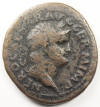 |
ROMAN EMPIRE
NERO ROME MINT BRONZE AS |
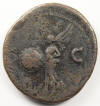 |
|
AD 65 |
27-29mm 9.4g | RIC I 312 |
"The first persecution of the Church took place in the year 67, under Nero, the sixth emperor of Rome. This monarch reigned for the space of five years, with tolerable credit to himself, but then gave way to the greatest extravagancy of temper, and to the most atrocious barbarities. Among other diabolical whims, he ordered that the city of Rome should be set on fire, which order was executed by his officers, guards, and servants. While the imperial city was in flames, he went up to the tower of Macaenas, played upon his harp, sung the song of the burning of Troy, and openly declared that 'he wished the ruin of all things before his death.' Besides the noble pile, called the Circus, many other palaces and houses were consumed; several thousands perished in the flames, were smothered in the smoke, or buried beneath the ruins.
This dreadful conflagration continued nine days; when Nero, finding that his conduct was greatly blamed, and a severe odium cast upon him, determined to lay the whole upon the Christians, at once to excuse himself, and have an opportunity of glutting his sight with new cruelties. This was the occasion of the first persecution; and the barbarities exercised on the Christians were such as even excited the commiseration of the Romans themselves. Nero even refined upon cruelty, and contrived all manner of punishments for the Christians that the most infernal imagination could design. In particular, he had some sewed up in skins of wild beasts, and then worried by dogs until they expired; and others dressed in shirts made stiff with wax, fixed to axletrees, and set on fire in his gardens, in order to illuminate them. This persecution was general throughout the whole Roman Empire; but it rather increased than diminished the spirit of Christianity. In the course of it, St. Paul and St. Peter were martyred.
To their names may be added, Erastus, chamberlain of Corinth; Aristarchus, the Macedonian, and Trophimus, an Ephesians, converted by St. Paul, and fellow-laborer with him, Joseph, commonly called Barsabas, and Ananias, bishop of Damascus; each of the Seventy." Book of Martyrs by John Foxe
The Second Persecution - Domitian AD 92-96
 |
ROMAN EMPIRE
DOMITIAN ROME MINT BRONZE AS |
 |
|
AD 85 |
27-30mm 11.2g | RIC II 381 |
"The emperor Domitian, who was naturally inclined to cruelty, first slew his brother, and then raised the second persecution against the Christians. In his rage he put to death some of the Roman senators, some through malice; and others to confiscate their estates. He then commanded all the lineage of David be put to death. Among the numerous martyrs that suffered during this persecution was Simeon, bishop of Jerusalem, who was crucified; and St. John, who was boiled in oil, and afterward banished to Patmos. Flavia, the daughter of a Roman senator, was likewise banished to Pontus; and a law was made, "That no Christian, once brought before the tribunal, should be exempted from punishment without renouncing his religion."
A variety of fabricated tales were, during this reign, composed in order to injure the Christians. Such was the infatuation of the pagans, that, if famine, pestilence, or earthquakes afflicted any of the Roman provinces, it was laid upon the Christians. These persecutions among the Christians increased the number of informers and many, for the sake of gain, swore away the lives of the innocent. Another hardship was, that, when any Christians were brought before the magistrates, a test oath was proposed, when, if they refused to take it, death was pronounced against them; and if they confessed themselves Christians, the sentence was the same.
The following were the most remarkable among the numerous martyrs who suffered during this persecution. Dionysius, the Areopagite, was an Athenian by birth, and educated in all the useful and ornamental literature of Greece. He then travelled to Egypt to study astronomy, and made very particular observations on the great and supernatural eclipse, which happened at the time of our Savior's crucifixion. The sanctity of his conversation and the purity of his manners recommended him so strongly to the Christians in general, that he was appointed bishop of Athens. Nicodemus, a benevolent Christian of some distinction, suffered at Rome during the rage of Domitian's persecution. Protasius and Gervasius were martyred at Milan.
Timothy was the celebrated disciple of St. Paul, and bishop of Ephesus, where he zealously governed the Church until A.D. 97. At this period, as the pagans were about to celebrate a feast called Catagogion, Timothy, meeting the procession, severely reproved them for their ridiculous idolatry, which so exasperated the people that they fell upon him with their clubs, and beat him in so dreadful a manner that he expired of the bruises two days later." Book of Martyrs by John Foxe
The Third Persecution - Trajan AD 112-117
 |
ROMAN EMPIRE
TRAJAN ROME MINT BRONZE SESTERTIUS |
 |
|
AD 106 |
33mm 21.6g | RIC II 527 |
"In the third persecution Pliny the Second, a man learned and famous, seeing the lamentable slaughter of Christians, and moved therewith to pity, wrote to Trajan, certifying him that there were many thousands of them daily put to death, of which none did any thing contrary to the Roman laws worthy of persecution. "The whole account they gave of their crime or error (whichever it is to be called) amounted only to this-viz. that they were accustomed on a stated day to meet before daylight, and to repeat together a set form of prayer to Christ as a God, and to bind themselves by an obligation-not indeed to commit wickedness; but, on the contrary-never to commit theft, robbery, or adultery, never to falsify their word, never to defraud any man: after which it was their custom to separate, and reassemble to partake in common of a harmless meal."
In this persecution suffered the blessed martyr, Ignatius, who is held in famous reverence among very many. This Ignatius was appointed to the bishopric of Antioch next after Peter in succession. Some do say, that he, being sent from Syria to Rome, because he professed Christ, was given to the wild beasts to be devoured. It is also said of him, that when he passed through Asia, being under the most strict custody of his keepers, he strengthened and confirmed the churches through all the cities as he went, both with his exhortations and preaching of the Word of God. Accordingly, having come to Smyrna, he wrote to the Church at Rome, exhorting them not to use means for his deliverance from martyrdom, lest they should deprive him of that which he most longed and hoped for. "Now I begin to be a disciple. I care for nothing, of visible or invisible things, so that I may but win Christ. Let fire and the cross, let the companies of wild beasts, let breaking of bones and tearing of limbs, let the grinding of the whole body, and all the malice of the devil, come upon me; be it so, only may I win Christ Jesus!" And even when he was sentenced to be thrown to the beasts, such as the burning desire that he had to suffer, that he spake, what time he heard the lions roaring, saying: "I am the wheat of Christ: I am going to be ground with the teeth of wild beasts, that I may be found pure bread."
Trajan being succeeded by Hadrian, the latter continued this third persecution with as much severity as his predecessor. About this time Alexander, bishop of Rome, with his two deacons, were martyred; as were Quirinus and Hernes, with their families; Zenon, a Roman nobleman, and about ten thousand other Christians.
In Mount Ararat many were crucified, crowned with thorns, and spears run into their sides, in imitation of Christ's passion. Eustachius, a brave and successful Roman commander, was by the emperor ordered to join in an idolatrous sacrifice to celebrate some of his own victories; but his faith (being a Christian in his heart) was so much greater than his vanity, that he nobly refused it. Enraged at the denial, the ungrateful emperor forgot the service of this skilful commander, and ordered him and his whole family to be martyred.
At the martyrdom of Faustines and Jovita, brothers and citizens of Brescia, their torments were so many, and their patience so great, that Calocerius, a pagan, beholding them, was struck with admiration, and exclaimed in a kind of ecstasy, "Great is the God of the Christians!" for which he was apprehended, and suffered a similar fate." Book of Martyrs by John Foxe
The Fourth Persecution - Marcus Aurelius AD 165-180
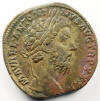 |
ROMAN EMPIRE
MARCUS AURELIUS ROME MINT SILVER DENARIUS |
 |
|
AD 178-179 |
30mm 22.4g | RIC III 1237 |
"Marcus Aurelius,
followed about the year of our Lord 161, a man of nature more stern and severe;
and, although in study of philosophy and in civil government no less
commendable, yet, toward the Christians sharp and fierce; by whom was moved the
fourth persecution. The cruelties used in this persecution were such that many
of the spectators shuddered with horror at the sight, and were astonished at the
intrepidity of the sufferers. Some of the martyrs were obliged to pass, with
their already wounded feet, over thorns, nails, sharp shells, etc. upon their
points, others were scourged until their sinews and veins lay bare, and after
suffering the most excruciating tortures that could be devised, they were
destroyed by the most terrible deaths. Germanicus, a young man, but a true
Christian, being delivered to the wild beasts on account of his faith, behaved
with such astonishing courage that several pagans became converts to a faith
which inspired such fortitude.
Polycarp, the venerable bishop of Smyrna, hearing that persons were seeking for him, escaped, but was discovered by a child. After feasting the guards who apprehended him, he desired an hour in prayer, which being allowed, he prayed with such fervency, that his guards repented that they had been instrumental in taking him. He was, however, carried before the proconsul, condemned, and burnt in the market place. The proconsul then urged him, saying, "Swear, and I will release thee;--reproach Christ." Polycarp answered, "Eighty and six years have I served him, and he never once wronged me; how then shall I blaspheme my King, Who hath saved me?" At the stake to which he was only tied, but not nailed as usual, as he assured them he should stand immovable, the flames, on their kindling the fagots, encircled his body, like an arch, without touching him; and the executioner, on seeing this, was ordered to pierce him with a sword, when so great a quantity of blood flowed out as extinguished the fire. But his body, at the instigation of the enemies of the Gospel, especially Jews, was ordered to be consumed in the pile, and the request of his friends, who wished to give it Christian burial, rejected. They nevertheless collected his bones and as much of his remains as possible, and caused them to be decently interred.
Metrodorus, a minister, who preached boldly, and Pionius, who made some excellent apologies for the Christian faith, were likewise burnt. Carpus and Papilus, two worthy Christians, and Agatonica, a pious woman, suffered martyrdom at Pergamopolis, in Asia. Felicitatis, an illustrious Roman lady, of a considerable family, and the most shining virtues, was a devout Christian. She had seven sons, whom she had educated with the most exemplary piety. Januarius, the eldest, was scourged, and pressed to death with weights; Felix and Philip, the two next had their brains dashed out with clubs; Silvanus, the fourth, was murdered by being thrown from a precipice; and the three younger sons, Alexander, Vitalis, and Martial, were beheaded. The mother was beheaded with the same sword as the three latter. Justin, the celebrated philosopher, fell a martyr in this persecution. He was a native of Neapolis, in Samaria, and was born A.D. 103. Justin was a great lover of truth, and a universal scholar; he investigated the Stoic and Peripatetic philosophy, and attempted the Pythagorean; but the behavior of our of its professors disgusting him, he applied himself to the Platonic, in which he took great delight. About the year 133, when he was thirty years of age, he became a convert to Christianity, and then, for the first time, perceived the real nature of truth. He wrote an elegant epistle to the Gentiles, and employed his talents in convincing the Jews of the truth of the Christian rites; spending a great deal of time in travelling, until he took up his abode in Rome, and fixed his habitation upon the Viminal mount. He kept a public school, taught many who afterward became great men, and wrote a treatise to confuse heresies of all kinds. As the pagans began to treat the Christians with great severity, Justin wrote his first apology in their favor. This piece displays great learning and genius, and occasioned the emperor to publish an edict in favor of the Christians. Soon after, he entered into frequent contests with Crescens, a person of a vicious life and conversation, but a celebrated cynic philosopher; and his arguments appeared so powerful, yet disgusting to the cynic, that he resolved on, and in the sequel accomplished, his destruction. The second apology of Justin, upon certain severities, gave Crescens the cynic an opportunity of prejudicing the emperor against the writer of it; upon which Justin, and six of his companions, were apprehended. Being commanded to sacrifice to the pagan idols, they refused, and were condemned to be scourged, and then beheaded; which sentence was executed with all imaginable severity. Several were beheaded for refusing to sacrifice to the image of Jupiter; in particular Concordus, a deacon of the city of Spolito.
Some of the restless northern nations having risen in arms against Rome, the emperor marched to encounter them. He was, however, drawn into an ambuscade, and dreaded the loss of his whole army. Enveloped with mountains, surrounded by enemies, and perishing with thirst, the pagan deities were invoked in vain; when the men belonging to the militine, or thundering legion, who were all Christians, were commanded to call upon their God for succor. A miraculous deliverance immediately ensued; a prodigious quantity of rain fell, which, being caught by the men, and filling their dykes, afforded a sudden and astonishing relief. It appears that the storm which miraculously flashed in the face of the enemy so intimidated them, that part deserted to the Roman army; the rest were defeated, and the revolted provinces entirely recovered. This affair occasioned the persecution to subside for some time, at least in those parts immediately under the inspection of the emperor; but we find that it soon after raged in France, particularly at Lyons, where the tortures to which many of the Christians were put, almost exceed the powers of description.
The principal of these martyrs were Vetius Agathus, a young man; Blandina, a Christian lady, of a weak constitution; Sanctus, a deacon of Vienna; red hot plates of brass were placed upon the tenderest parts of his body; Biblias, a weak woman, once an apostate. Attalus, of Pergamus; and Pothinus, the venerable bishop of Lyons, who was ninety years of age. Blandina, on the day when she and the three other champions were first brought into the amphitheater, she was suspended on a piece of wood fixed in the ground, and exposed as food for the wild beasts; at which time, by her earnest prayers, she encouraged others. But none of the wild beasts would touch her, so that she was remanded to prison. When she was again produced for the third and last time, she was accompanied by Ponticus, a youth of fifteen, and the constancy of their faith so enraged the multitude that neither the sex of the one nor the youth of the other were respected, being exposed to all manner of punishments and tortures. Being strengthened by Blandina, he persevered unto death; and she, after enduring all the torments heretofore mentioned, was at length slain with the sword." Book of Martyrs by John Foxe
The Fifth Persecution - Septimius Severus AD 202-210
 |
ROMAN EMPIRE
SEPTIMIUS SEVERUS LAODICEA MINT SILVER DENARIUS |
 |
|
AD 198-202 |
20mm 3.3g | RIC IV 503 |
"Severus, having
been recovered from a severe fit of sickness by a Christian, became a great
favorer of the Christians in general; but the prejudice and fury of the ignorant
multitude prevailing, obsolete laws were put in execution against the
Christians. The progress of Christianity alarmed the pagans, and they revived
the stale calumny of placing accidental misfortunes to the account of its
professors, A.D. 192. But, though persecuting malice raged, yet the Gospel shone
with resplendent brightness; and, firm as an impregnable rock, withstood the
attacks of its boisterous enemies with success. Tertullian, who lived in this
age, informs us that if the Christians had collectively withdrawn themselves
from the Roman territories, the empire would have been greatly depopulated.
Victor, bishop of Rome, suffered martyrdom in the first year of the third century, A.D. 201. Leonidus, the father of the celebrated Origen, was beheaded for being a Christian. Many of Origen's hearers likewise suffered martyrdom; particularly two brothers, named Plutarchus and Serenus; another Serenus, Heron, and Heraclides, were beheaded. Rhais had boiled pitch poured upon her head, and was then burnt, as was Marcella her mother. Potainiena, the sister of Rhais, was executed in the same manner as Rhais had been; but Basilides, an officer belonging to the army, and ordered to attend her execution, became her convert.
Basilides being, as an officer, required to take a certain oath, refused, saying, that he could not swear by the Roman idols, as he was a Christian. Struck with surpsie, the people could not, at first, believe what they heard; but he had no sooner confirmed the same, than he was dragged before the judge, committed to prison, and speedily afterward beheaded.
Irenaeus, bishop of Lyons, was born in Greece, and received both a polite and a Christian education. It is generally supposed that the account of the persecutions at Lyons was written by himself. He succeeded the martyr Pothinus as bishop of Lyons, and ruled his diocese with great propriety; he was a zealous opposer of heresies in general, and, about A.D. 187, he wrote a celebrated tract against heresy. Victor, the bishop of Rome, wanting to impose the keeping of Easter there, in preference to other places, it occasioned some disorders among the Christians. In particular, Irenaeus wrote him a synodical epistle, in the name of the Gallic churches. This zeal, in favor of Christianity, pointed him out as an object of resentment to the emperor; and in A.D. 202, he was beheaded.
The persecutions now extending to Africa, many were martyred in that quarter of the globe; the most particular of whom we shall mention. Perpetua, a married lady, of about twenty-two years. Those who suffered with her were, Felicitas, a married lady, big with child at the time of her being apprehended, and Revocatus, catechumen of Carthage, and a slave. The names of the other prisoners, destined to suffer upon this occasion, were Saturninus, Secundulus, and Satur. On the day appointed for their execution, they were led to the amphitheater. Satur, Saturninus, and Revocatus were ordered to run the gauntlet between the hunters, or such as had the care of the wild beasts. The hunters being drawn up in two ranks, they ran between, and were severely lashed as they passed. Felicitas and Perpetua were stripped, in order to be thrown to a mad bull, which made his first attack upon Perpetua, and stunned her; he then darted at Felicitas, and gored her dreadfully; but not killing them, the executioner did that office with a sword. Revocatus and Satur were destroyed by wild beasts; Saturninus was beheaded; and Secundulus died in prison. These executions were in the 205, on the eighth day of March." Book of Martyrs by John Foxe
The Sixth Persecution - Maximinus Thrax AD 235-238
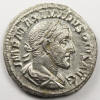 |
ROMAN EMPIRE
MAXIMINUS THRAX ROME MINT SILVER DENARIUS |
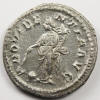 |
|
AD 235-236 |
19mm 2.9g | RIC IV 13 |
"A.D. 235, was in
the time of Maximinus. In Cappadocia, the president, Seremianus, did all he
could to exterminate the Christians from that province.
The principal persons who perished under this reign were Pontianus, bishop of Rome; Anteros, a Grecian, his successor, who gave offence to the government by collecting the acts of the martyrs, Pammachius and Quiritus, Roman senators, with all their families, and many other Christians; Simplicius, senator; Calepodius, a Christian minister, thrown into the Tyber; Martina, a noble and beautiful virgin; and Hippolitus, a Christian prelate, tied to a wild horse, and dragged until he expired. During this persecution, raised by Maximinus, numberless Christians were slain without trial, and buried indiscriminately in heaps, sometimes fifty or sixty being cast into a pit together, without the least decency.
The tyrant Maximinus dying, A.D. 238, was succeeded by Gordian, during whose reign, and that of his successor Philip, the Church was free from persecution for the space of more than ten years; but in A.D. 249, a violent persecution broke out in Alexandria, at the instigation of a pagan priest, without the knowledge of the emperor." Book of Martyrs by John Foxe
The Seventh Persecution - Trajan Decius AD 250-251
 |
ROMAN EMPIRE
TRAJAN DECIUS ROME MINT SILVER ANTONINIANUS |
 |
|
AD 250-251 |
21-24mm 3.7g | RIC IV 21b |
"This was
occasioned partly by the hatred he bore to his predecessor Philip, who was
deemed a Christian and was partly by his jealousy concerning the amazing
increase of Christianity; for the heathen temples began to be forsaken, and the
Christian churches thronged. These reasons stimulated Decius to attempt the very
extirpation of the name of Christian; and it was unfortunate for the Gospel,
that many errors had, about this time, crept into the Church: the Christians
were at variance with each other; self-interest divided those whom social love
ought to have united; and the virulence of pride occasioned a variety of
factions. The heathens in general were ambitious to enforce the imperial decrees
upon this occasion, and looked upon the murder of a Christian as a merit to
themselves. The martyrs, upon this occasion, were innumerable; but the principal
we shall give some account of.
Fabian, the bishop of Rome, was the first person of eminence who felt the severity of this persecution. The deceased emperor, Philip, had, on account of his integrity, committed his treasure to the care of this good man. But Decius, not finding as much as his avarice made him expect, determined to wreak his vengeance on the good prelate. He was accordingly seized; and on January 20, A.D. 250, he suffered decapitation. Julian, a native of Cilicia, as we are informed by St. Chrysostom, was seized upon for being a Christian. He was put into a leather bag, together with a number of serpents and scorpions, and in that condition thrown into the sea.
Peter, a young man, amiable for the superior qualities of his body and mind, was beheaded for refusing to sacrifice to Venus. He said, "I am astonished you should sacrifice to an infamous woman, whose debaucheries even your own historians record, and whose life consisted of such actions as your laws would punish. No, I shall offer the true God the acceptable sacrifice of praises and prayers." Optimus, the proconsul of Asia, on hearing this, ordered the prisoner to be stretched upon a wheel, by which all his bones were broken, and then he was sent to be beheaded. Nichomachus, being brought before the proconsul as a Christian, was ordered to sacrifice to the pagan idols. Nichomachus replied, "I cannot pay that respect to devils, which is only due to the Almighty." This speech so much enraged the proconsul that Nichomachus was put to the rack. After enduring the torments for a time, he recanted; but scarcely had he given this proof of his frailty, than he fell into the greatest agonies, dropped down on the ground, and expired immediately.
Lucian and Marcian, two wicked pagans, though skilful magicians, becoming converts to Christianity, to make amends for their former errors, lived the lives of hermits, and subsisted upon bread and water only. After some time spent in this manner, they became zealous preachers, and made many converts. The persecution, however, raging at this time, they were seized upon, and carried before Sabinus, the governor of Bithynia. On being asked by what authority they took upon themselves to preach, Lucian answered, 'That the laws of charity and humanity obliged all men to endeavor the conversion of their neighbors, and to do everything in their power to rescue them from the snares of the devil." Lucian having answered in this manner, Marcian said, "Their conversion was by the same grace which was given to St. Paul, who, from a zealous persecutor of the Church, became a preacher of the Gospel." The proconsul, finding that he could not prevail with them to renounce their faith, condemned them to be burnt alive, which sentence was soon after executed." Book of Martyrs by John Foxe
The Eighth Persecution - Valerian AD 257-259
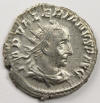 |
ROMAN EMPIRE
VALERIAN VIMINACIUM MINT SILVER ANTONINIANUS |
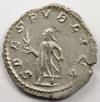 |
|
AD 253-255 |
21mm 3.2g | RIC V 257 |
"Began under
Valerian, in the month of April, 257, and continued for three years and six
months. The martyrs that fell in this persecution were innumerable, and their
tortures and deaths as various and painful. The most eminent martyrs were the
following, though neither rank, sex, nor age were regarded.
Rufina and Secunda were two beautiful and accomplished ladies, daughters of Asterius, a gentleman of eminence in Rome. Rufina, the elder, was designed in marriage for Armentarius, a young nobleman; Secunda, the younger, for Verinus, a person of rank and opulence. The suitors, at the time of the persecution's commencing, were both Christians; but when danger appeared, to save their fortunes, they renounced their faith. They took great pains to persuade the ladies to do the same, but, disappointed in their purpose, the lovers were base enough to inform against the ladies, who, being apprehended as Christians, were brought before Junius Donatus, governor of Rome, where, A.D. 257, they sealed their martyrdom with their blood.
Stephen, bishop of Rome, was beheaded in the same year, and about that time Saturninus, the pious orthodox bishop of Toulouse, refusing to sacrifice to idols, was treated with all the barbarous indignities imaginable, and fastened by the feet to the tail of a bull. Upon a signal given, the enraged animal was driven down the steps of the temple, by which the worthy martyr's brains were dashed out.
Sextus succeeded Stephen as bishop of Rome. He is supposed to have been a Greek by birth or by extraction, and had for some time served in the capacity of a deacon under Stephen. His great fidelity, singular wisdom, and uncommon courage distinguished him upon many occasions; and the happy conclusion of a controversy with some heretics is generally ascribed to his piety and prudence. In the year 258, Marcianus, who had the management of the Roman government, procured an order from the emperor Valerian, to put to death all the Christian clergy in Rome, and hence the bishop with six of his deacons, suffered martyrdom in 258.
Let us draw near to the fire of martyred Lawrence, that our cold hearts may be warmed thereby. The merciless tyrant, understanding him to be not only a minister of the sacraments, but a distributor also of the Church riches, promised to himself a double prey, by the apprehension of one soul. First, with the rake of avarice to scrape to himself the treasure of poor Christians; then with the fiery fork of tyranny, so to toss and turmoil them, that they should wax weary of their profession. With furious face and cruel countenance, the greedy wolf demanded where this Lawrence had bestowed the substance of the Church: who, craving three days' respite, promised to declare where the treasure might be had. In the meantime, he caused a good number of poor Christians to be congregated. So, when the day of his answer was come, the persecutor strictly charged him to stand to his promise. Then valiant Lawrence, stretching out his arms over the poor, said: "These are the precious treasure of the Church; these are the treasure indeed, in whom the faith of Christ reigneth, in whom Jesus Christ hath His mansion-place. What more precious jewels can Christ have, than those in whom He hath promised to dwell? For so it is written, 'I was an hungered, and ye gave me meat: I was thirsty, and ye gave me drink: I was a stranger, and ye took me in.' And again, 'Inasmuch as ye have done it unto one of the least of these my brethren, ye have done it unto me.' What greater riches can Christ our Master possess, than the poor people in whom He loveth to be seen?"
It is here proper to take notice of the singular but miserable fate of the emperor Valerian, who had so long and so terribly persecuted the Christians. This tyrant, by a stretagem, was taken prisoner by Sapor, emperor of Persia, who carried him into his own country, and there treated him with the most unexampled indignity, making him kneel down as the meanest slave, and treading upon him as a footstool when he mounted his horse. After having kept him for the space of seven years in this abject state of slavery, he caused his eyes to be put out, though he was then eighty-three years of age. This not satiating his desire of revenge, he soon after ordered his body to be flayed alive, and rubbed with salt, under which torments he expired; and thus fell one of the most tyrannical emperors of Rome, and one of the greatest persecutors of the Christians. A.D. 260, Gallienus, the son of Valerian, succeeded him, and during his reign (a few martyrs excepted) the Church enjoyed peace for some years." Book of Martyrs by John Foxe
The Ninth Persecution - Aurelian AD 270-275
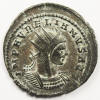 |
ROMAN EMPIRE
AURELIAN CYZICUS MINT BRONZE ANTONINIANUS |
 |
|
AD 274-275 |
24mm 4.4g | RIC |
"The principal
sufferers were: Felix, bishop of Rome. This prelate was advanced to the Roman
see in 274. He was the first martyr to Aurelian's petulancy, being beheaded on
the twenty-second of December, in the same year. Agapetus, a young gentleman,
who sold his estate, and gave the money to the poor, was seized as a Christian,
tortured, and then beheaded at Praeneste, a city within a day's journey of Rome.
These are the only martyrs left upon record during this reign, as it was soon
put to a stop by the emperor's being murdered by his own domestics, at
Byzantium.
Aurelian was succeeded by Tacitus, who was followed by Probus, as the latter was by Carus: this emperor being killed by a thunder storm, his sons, Carnious and Numerian, succeeded him, and during all these reigns the Church had peace." Book of Martyrs by John Foxe
The Tenth Persecution - Diocletian and Galerius AD 303-313
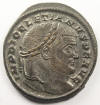 |
ROMAN EMPIRE
DIOCLETIAN AQUILEIA MINT SILVERED BRONZE FOLLIS |
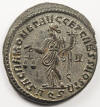 |
|
AD 300-301 |
27mm 9.7g | RIC VI 31a |
 |
ROMAN EMPIRE
GALERIUS ANTIOCH MINT BRONZE FOLLIS |
 |
|
AD 307-308 |
22mm 5.4g | RIC VI 85 |
"Under the Roman
emperors, commonly called the Era of the Martyrs, was occasioned partly by the
increasing number and luxury of the Christians, and the hatred of Galerius, the
adopted son of Diocletian, who, being stimulated by his mother, a bigoted pagan,
never ceased persuading the emperor to enter upon the persecution, until he had
accomplished his purpose.
The fatal day fixed upon to commence the bloody work, was the twenty-third of February, A.D. 303, that being the day in which the Terminalia were celebrated, and on which, as the cruel pagans boasted, they hoped to put a termination to Christianity. On the appointed day, the persecution began in Nicomedia, on the morning of which the prefect of that city repaired, with a great number of officers and assistants, to the church of the Christians, where, having forced open the doors, they seized upon all the sacred books, and committed them to the flames. The whole of this transaction was in the presence of Diocletian and Galerius, who, not contented with burning the books, had the church levelled with the ground. This was followed by a severe edict, commanding the destruction of all other Christian churches and books; and an order soon succeeded, to render Christians of all denomination outlaws. The publication of this edict occasioned an immediate martyrdom, for a bold Christian not only tore it down from the place to which it was affixed, but execrated the name of the emperor for his injustice. A provocation like this was sufficient to call down pagan vengeance upon his head; he was accordingly seized, severely tortured, and then burned alive.
All the Christians were apprehended and imprisoned; and Galerius privately ordered the imperial palace to be set on fire, that the Christians might be charged as the incendiaries, and a plausible pretence given for carrying on the persecution with the greater severities. A general sacrifice was commenced, which occasioned various martyrdoms. No distinction was made of age or sex; the name of Christian was so obnoxious to the pagans that all indiscriminately fell sacrifices to their opinions. Many houses were set on fire, and whole Christian families perished in the flames; and others had stones fastened about their necks, and being tied together were driven into the sea. The persecution became general in all the Roman provinces, but more particularly in the east; and as it lasted ten years, it is impossible to ascertain the numbers martyred, or to enumerate the various modes of martyrdom.
Racks, scourges, swords, daggers, crosses, poison, and famine, were made use of in various parts to dispatch the Christians; and invention was exhausted to devise tortures against such as had no crime, but thinking differently from the votaries of superstition.
Sebastian, a celebrated martyr, was born at Narbonne, in Gaul, instructed in the principles of Christianity at Milan, and afterward became an officer of the emperor's guard at Rome. He remained a true Christian in the midst of idolatry; unallured by the splendors of a court, untained by evil examples, and uncontaminated by the hopes of preferment. Refusing to be a pagan, the emperor ordered him to be taken to a field near the city, termed the Campus Martius, and there to be shot to death with arrows; which sentence was executed accordingly. Some pious Christians coming to the place of execution, in order to give his body burial, perceived signs of life in him, and immediately moving him to a place of security, they, in a short time effected his recovery, and prepared him for a second martyrdom; for, as soon as he was able to go out, he placed himself intentionally in the emperor's way as he was going to the temple, and reprehended him for his various cruelties and unreasonable prejudices against Christianity. As soon as Diocletian had overcome his surprise, he ordered Sebastian to be seized, and carried to a place near the palace, and beaten to death; and, that the Christians should not either use means again to recover or bury his body, he ordered that it should be thrown into the common sewer. Nevertheless, a Christian lady named Lucina, found means to remove it from the sewer, and bury it in the catacombs, or repositories of the dead.
Eulalia, a Spanish lady of a Christian family, was remarkable in her youth for sweetness of temper, and solidity of understanding seldom found in the capriciousness of juvenile years. Being apprehended as a Christian, the magistrate attempted by the mildest means, to bring her over to paganism, but she ridiculed the pagan deities with such asperity, that the judge, incensed at her behavior, ordered her to be tortured. Her sides were accordingly torn by hooks, and her breasts burnt in the most shocking manner, until she expired by the violence of the flames, December, A.D. 303.
In the year 304, when the persecution reached Spain, Dacian, the governor of Terragona, ordered Valerius the bishop, and Vincent the deacon, to be seized, loaded with irons, and imprisoned. The prisoners being firm in their resolution, Valerius was banished, and Vincent was racked, his limbs dislocated, his flesh torn with hooks, and he was laid on a gridiron, which had not only a fire placed under it, but spikes at the top, which ran into his flesh. These torments neither destroying him, nor changing his resolutions, he was remanded to prison, and confined ina small, loathsome, dark dungeon, strewed with sharp flints, and pieces of broken glass, where he died, January 22, 304. His body was thrown into the river." Book of Martyrs by John Foxe
CLICK HERE TO RETURN TO THE VIRTUAL MUSEUM LOBBY